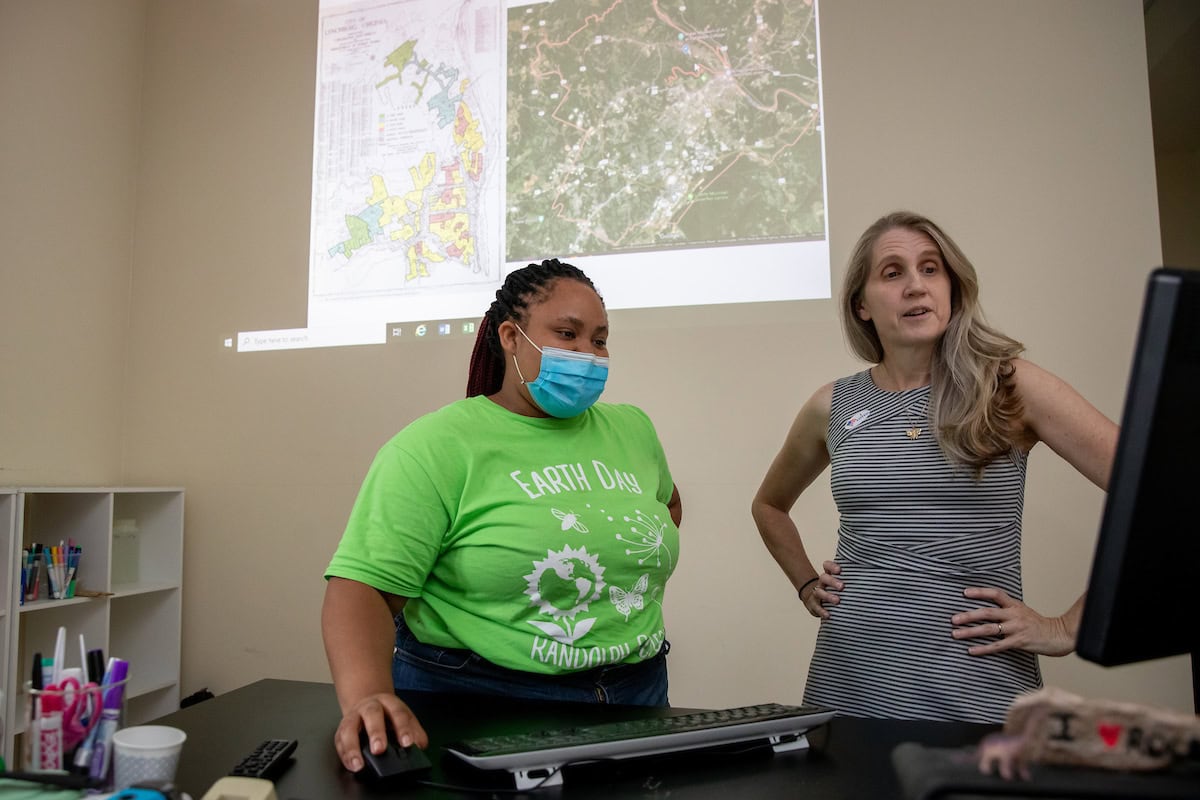Virginia Heat Watch: Summer research focusing on climate vulnerability as part of statewide project
This story is part of an ongoing series featuring the work of faculty and students participating in Randolph’s Summer Research Program.

Shae Starks ’22 and professor Karin Warren are working on a summer research project looking at how heat affects communities differently.
Karin Warren has been after Shae Starks ’22 to make her interest in environmental studies official for a few years now.
Starks, a chemistry major, recently declared it as a minor—just in time to work with Warren on a summer research project tackling a topic close to her heart.
This summer, Randolph is one of 12 institutions in the Virginia Foundation for Independent Colleges (VFIC) collaborating on Virginia Heat Watch, which will map and analyze where residents are most at-risk during heat waves.
Previous heat mapping studies have shown that historically red-lined areas in cities are most vulnerable, something Starks encountered while researching heat and health impacts for Warren’s Energy and Society class this spring.
“Shae is a great interdisciplinary thinker,” said Warren, Randolph’s Herzog Family Professor of Environmental Studies and Science. “She’s passionate about the application of climate science to social justice and how that intersects with city planning, addressing what risks exist in our communities, how they’re different for different groups, and how we can develop solutions that are equitable.”
That’s exactly the goal of Virginia Heat Watch, which the VFIC plans to continue for the next two to five years. The results will help develop equitable, community-based strategies to address climate vulnerabilities and health risks from climate change.
The work they’ve been doing is already influencing Starks’ potential career path.
“I’ve talked to some professors about this, maybe being an environmental urban planner, where I focus on creating more green spaces or energy use, and how we can be more efficient while using less energy in some buildings,” she said.
For Virginia Heat Watch, participants are spread out across nine communities, where they’ll recruit volunteers to gather data using techniques developed by Portland-based CAPA Strategies.
The work will require them to drive, bike, and walk along designated routes, often during the hottest parts of summer, with thermal sensors recording air temperatures and humidity at certain times of day.
Randolph is leading the charge for Team Lynchburg, which also includes participants from the University of Lynchburg and Sweet Briar College.
Warren and Starks have been organizing the heat mapping campaign and exploring community-based energy strategies to address heat risk. Starks also is working on a story map for the project.
“Shae has lots of great ideas and enthusiasm,” Warren said. “It’s also really helpful because if we need someone to help us on campus with something, she’s really persuasive. You build up social capital over time, and Shae has been such an integral part of Randolph in her three years here.”
Starks is staying on a couple extra weeks after Randolph’s Summer Research Program ends on July 9, so she can participate in the actual data collection in mid-July. The findings will be available in September, and Warren plans to use them in her fall climatology course.
They’ve also applied for a small exploratory grant that would study connections between climate change and environmental justice. If successful, it would provide funding for interns to continue the work this fall.
“It’s going to be a long process,” Starks said, “but I’m really excited to see it all come to fruition.”
Tags: environmental science, environmental studies, heat mapping, Karin Warren, student faculty research, summer research, summer research 2021, VFIC, Virginia Heat Watch
